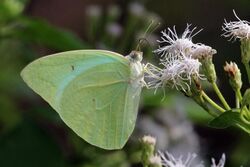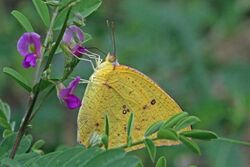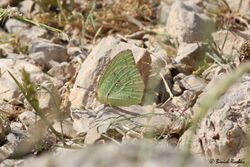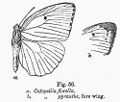Biology:Catopsilia florella
| Catopsilia florella | |
|---|---|

| |
| Male, Ghana | |

| |
| Female Aburi Botanical Gardens, Ghana | |
| Scientific classification | |
| Domain: | Eukaryota |
| Kingdom: | Animalia |
| Phylum: | Arthropoda |
| Class: | Insecta |
| Order: | Lepidoptera |
| Family: | Pieridae |
| Genus: | Catopsilia |
| Species: | C. florella
|
| Binomial name | |
| Catopsilia florella (Fabricius, 1775)[2]
| |
| Synonyms | |
| |
Catopsilia florella, the African migrant, African emigrant, or common vagrant, is a butterfly of the family Pieridae. It is found in Africa (including Madagascar ), Arabia (United Arab Emirates, Saudi Arabia, Oman) and the Canary Islands. Like Catopsilia pomona, this species also has a habit of migration.[3]
Many early authors mentioned the presence of this species in Asia;[4][5] but those were probably due to confusion arises as Catopsilia pyranthe females exhibit a lot of seasonal variations.[6] Catopsilia florella is not included as a species in India in any recent checklists.[7]
The wingspan is 54–60 mm for males and 56–66 mm for females. Adults are on wing year-round. From South Africa, adults migrate from summer to autumn. They fly in a north-eastern direction.[8]
The larvae feed on Senna occidentalis, Senna septentrionalis, Senna petersiana, Senna italica, Cassia javanica, and Cassia fistula.[9]
Gallery
Mud-puddling, Lagos, Nigeria
References
- ↑ Armstrong, A.J.; Westrip, J.R.S. (2021). "Catopsilia florella". IUCN Red List of Threatened Species 2021: e.T174213A161331664. doi:10.2305/IUCN.UK.2021-1.RLTS.T174213A161331664.en. https://www.iucnredlist.org/species/174213/161331664. Retrieved 14 June 2022.
- ↑ Catopsilia florella at Markku Savela's Lepidoptera and Some Other Life Forms
- ↑ Larsen, T. B. (1992). "Migration of Catopsilia florella in Botswana (Lepidoptera:Pieridae)". Tropical Lepidoptera 3 (2): 11. https://www.academia.edu/1770650. Retrieved 4 May 2018.
- ↑ Bingham, C.T. (1907). The Fauna of British India, Including Ceylon and Burma. II (1st ed.). London: Taylor and Francis, Ltd.. pp. 223–224. https://archive.org/stream/butterflies02bingiala#page/222/mode/2up/.
- ↑ Larsen, T. B. (1977). "Butterfly Migrations in the Nilgiri Hills of South India (Lepidoptera: Rhopalocera)". The Journal of the Bombay Natural History Society 74: 546–549. https://www.biodiversitylibrary.org/item/187442#page/594/mode/1up. Retrieved 4 May 2018.
- ↑ Swinhoe, Charles (1905–1910). Lepidoptera Indica. Vol. VII. London: Lovell Reeve and Co.. pp. 90–94. https://www.biodiversitylibrary.org/item/103631#page/104/mode/1up.
- ↑ Varshney, R.; Smetacek, P.. A Synoptic Catalogue of the Butterflies of India. (2015 ed.). New Delhi: Butterfly Research Centre, Bhimtal and Indinov Publishing. p. 67.
- ↑ Woodhall, Steve (2005). Field Guide to Butterflies of South Africa. Cape Town, South Africa: Struik. ISBN 978-1-86872-724-7.
- ↑ Martiré, J. & Rochat, D. (2008). Les Papillons de la Réunion & leurs chenilles. Biotope.
Wikidata ☰ Q1309984 entry
 |









